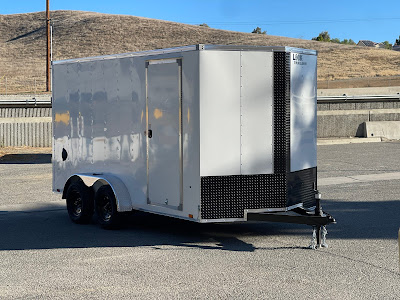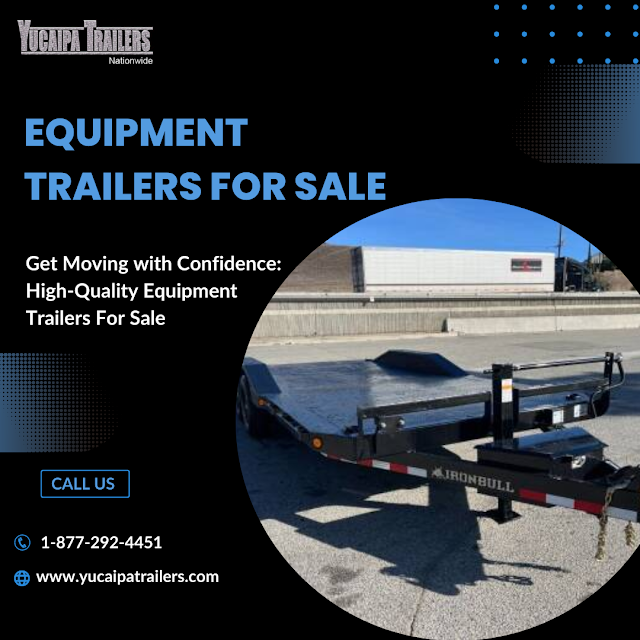How to Choose the Best Enclosed Trailer for Your Hauling Needs
When it comes to transporting equipment, supplies, or personal belongings, having the best enclosed trailer makes all the difference. Whether you're a contractor, landscaper, small business owner, or weekend adventurer, your trailer isn't just a tool—it's a dependable partner that keeps your cargo secure and protected.
But how do you pick the right one? With so many sizes, styles, and options on the market, choosing the best enclosed trailer for your hauling needs can feel overwhelming. Don’t worry—this guide will walk you through everything you should consider before making the investment.
1. Understand Your Hauling Requirements
Before you start shopping, clearly define what you’ll be hauling and how often.
Ask Yourself:
-
Are you transporting tools, furniture, ATVs, or construction materials?
-
How much weight will you carry regularly?
-
Will you need to access the trailer frequently throughout the day?
-
Do you need weather protection for your cargo?
Utility enclosed trailers are ideal for sensitive items that require protection from the elements and security from theft. Choose based on what your typical load looks like—not just what you might haul once in a while.
2. Choose the Right Size
Enclosed trailers come in many sizes—from compact 4x6 models to spacious 8.5x24 units and beyond. Picking the right size is crucial to balance capacity, towability, and cost.
Popular Sizes:
-
5x8 or 6x10 – Ideal for small business deliveries or tools
-
7x14 or 7x16 – Great for contractors and mobile service providers
-
8.5x20+ – Best for car haulers or heavy equipment transport
Make sure your tow vehicle can handle the trailer’s size and weight (empty and loaded). Overestimating can lead to inefficient fuel use; underestimating can limit your trailer’s usefulness.
3. Consider Single vs. Tandem Axles
The axle configuration affects your trailer’s performance, maintenance, and payload capacity.
Differences:
-
Single Axle Trailers
-
Lower cost and easier to maneuver
-
Ideal for light-duty hauling (under 3,000 lbs)
-
-
Tandem Axle Trailers
-
Increased stability, better weight distribution
-
Suitable for heavy loads and long-distance towing
-
If you regularly carry heavy materials or drive on rough terrain, tandem axles are worth the investment.
4. Choose the Right Door Configuration
Access to your cargo is key. The type of door on your trailer should match your loading needs and workflow.
Options:
-
Ramp Door – Great for rolling in mowers, ATVs, or heavy equipment
-
Barn Doors – Ideal for manual loading or tight parking spots
-
Side Door – Convenient access for tools and supplies
Some trailers offer both rear and side access, giving you flexibility no matter how or where you use your trailer.
5. Look at Frame and Construction Materials
Durability matters—especially if you’re planning to use your trailer regularly or in harsh environments like construction sites or long-distance hauls.
Key Features:
-
Steel Frame – Strong and affordable, but requires rust protection
-
Aluminum Frame – Lightweight and rust-resistant but can be more expensive
-
Plywood or Metal Walls/Flooring – Look for sturdy interiors that hold up under repeated use
Invest in quality construction now to avoid frequent repairs or replacements later.
6. Check Ventilation and Interior Features
Interior comfort and cargo protection go hand-in-hand. A poorly ventilated trailer can lead to mold, odors, or damaged goods.
Interior Must-Haves:
-
Roof vents or side vents for airflow
-
Interior lighting for visibility
-
Tie-downs or E-track systems for cargo security
-
Insulation if carrying temperature-sensitive materials
These features are especially useful for businesses that store equipment or spend time working inside the trailer.
7. Think About Customization and Upgrades
Many enclosed cargo trailer dealers offer upgrade options to tailor your trailer to your business or lifestyle.
Popular Upgrades:
-
Ladder racks
-
Toolboxes and storage shelves
-
Electrical packages (power outlets, LED lighting)
-
Flooring upgrades (rubber mats, treated wood)
A little customization can significantly improve productivity, efficiency, and organization.
Conclusion
Choosing the best enclosed trailer isn’t just about finding a great deal—it’s about getting the right tool for the job. From size and axle type to interior upgrades and frame material, each decision you make should match your hauling goals.
Whether you're a small business owner needing a mobile workstation or an outdoor enthusiast needing secure storage, there’s a trailer out there built for you.
At Yucaipa Trailers, we specialize in helping California buyers find high-quality, durable enclosed trailers for sale that deliver long-term value. Our team takes the time to understand your needs and guide you toward the perfect trailer for your specific requirements.
FAQs About Buying Enclosed Trailers
Q1: Do I need a special license to tow an enclosed trailer?
Most personal or light commercial enclosed trailers don’t require a special license, but check your state’s regulations if the GVWR exceeds 10,000 lbs.
Q2: Are aluminum trailers better than steel?
Aluminum trailers are lighter and more rust-resistant, while steel trailers are stronger and usually less expensive.
Q3: How much do enclosed trailers cost?
Prices vary by size and features. Small cargo trailers may start around $3,000, while larger, upgraded models can reach $10,000 or more.
Q4: How long do enclosed trailers last?
With proper care, a quality trailer can last 15–20 years or longer.
Q5: Can I finance an enclosed trailer?
Yes! Many enclosed trailer dealers near you offer flexible financing plans for both personal and business purchases.




Comments
Post a Comment